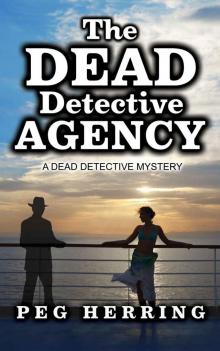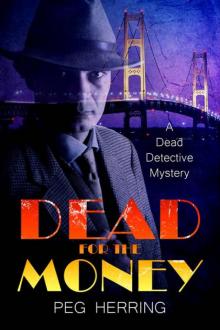- Home
- Peg Herring
Dead for the Money
Dead for the Money Read online
Dead for the Money
The Dead Detective Mysteries # 2
ISBN: 978-0-9571527-1-7
Digital-ebook version
© 2012 by Peg Herring
Published in the United Kingdom by LL-Publications 2012
www.ll-publications.com
57 Blair Avenue
Hurlford
Scotland
KA1 5AZ
Edited by Leslie Brown
Book layout and typesetting by jimandzetta.com
Cover art and design © 2012 by
Amanda Kelsey of Razzle Dazzle Design (razzdazzdesign.com)
Published in the US, UK and Worldwide
Dead for the Money – The Dead Detective Mysteries #2 is a work of fiction. The names, characters, and incidents are entirely the work of the author’s imagination. Any resemblance to actual persons, living or dead, or events, is entirely coincidental.
All rights reserved. No part of this publication may be copied, transmitted, or recorded by any means whatsoever, including printing, photocopying, file transfer, or any form of data storage, mechanical or electronic, without the express written consent of the publisher. In addition, no part of this publication may be lent, re-sold, hired, or otherwise circulated or distributed, in any form whatsoever, without the express written consent of the publisher.
Reviewers Investigate
The Dead Detective Agency
“The Dead Detective Agency combines belief in the afterlife with the paradoxical uncertainty of survival in the present, and is full of wickedly dark humor combined with regular laugh-out-loud moments.”
—Sam Millar, New York Journal of Books
(nyjournalofbooks.com)
“A line I’m sure many of us on Earth can relate to is when the policeman ‘used his remote as a weapon against commercials’. I wish I’d written that...This limbo novel has much to recommend it. ”
—Geoff Nelder, The Compulsive Reader
(www.compulsivereader.com)
“This is the first book by Peg Herring I have had the pleasure of reviewing. I look forward to the next case of The Dead Detective Mystery Series: Dead for the Money.”
—Chrystal Dorsey, Fiction Addict
(fictionaddict.com)
“This is a murder mystery unlike any other, with a premise so twisty, so surprising, so excellent, you’re bound to read it fast and beg for the next installment.”
— C.K.Crigger, Buried Under Books
ACKNOWLEDGEMENT
The author would like to thank James Ecker, Retired Chief Engineer for the Mackinac Bridge Authority, for his help with the specifics of what it’s like to climb around on the Mackinac Bridge. Though such activity is neither allowed nor recommended, Jim helped me imagine and describe what it would be like in the scenario presented in this book. If there are mistakes, they are mine, not his, because he has been everywhere on that impressive structure and knows it like most people know their own backyards.
Chapter One
“WHO KNEW HEAVEN WAS LIKE A LUXURY LINER?” the man across from Seamus said, spearing the last bite of his steak. His head was shaved and shiny, and tattoos curled around his ears like ram’s horns. He was called Joshua, but he did not bring Jericho to mind. More like pure Jersey. “It’s not what I imagined.” He leaned back from his empty plate, patting his stomach with a satisfied air. “But I gotta tell you, it’s pretty great.”
“This is our introduction to the afterlife.”
Seamus glanced at the speaker, a sweet-faced young woman in a diaphanous turquoise evening gown. Noting her work-roughened hands, he guessed it was the nicest thing she’d ever worn.
“This ship, the feeling that we’re on a cruise” —she waved vaguely at the elegant room around them— “It’s all designed to help us adjust to the fact that our lives are over.”
“That’s right,” another woman put in. “They provide all the comforts while we prepare for the final step.”
“Which I hear is much better.” The first woman looked around the table. “I believe that.”
There was a moment of silence as the diners considered their own opinions. In the background, the band finished a smooth rendition of “The Impossible Dream.”
As the notes of a new song began softly, a wide-eyed girl of about nineteen asked, “What about punishment?” Her food had hardly been touched, and Seamus figured she had not yet adjusted to the idea of being dead.
“Oh, that will all be taken care of,” said a woman a few chairs down whose facial wrinkles were intensified by a screaming-red dye job on her hair. “My caseworker said not to worry about it.”
Although he generally stayed out of such conversations, Seamus could not ignore the look of dread on the girl’s face. “Think of all the good things you’ve heard about the afterlife,” he told her. “That’s what’s true.”
Her spine relaxed a little and she smiled timidly. It was the same every night: new faces, but the same fears, anticipation, and wonder. The newly dead talking about being newly dead.
“It really is like a sea cruise,” one man said.
“With everything you can imagine and more,” Joshua agreed.
Seamus wondered how many of them understood that they would soon forget the details of their former lives. In a day or two, the pretty girl in the red dress would recall that she liked musical comedies but would be unable to name a specific occasion when she had seen one or any one of the friends who accompanied her. Glancing around the table, he assessed the likelihood that someone here might object to that. No. Not a Portalist among them. All of his dinner companions would all accept the forgetting and make the crossing, content to leave the world, and even this ship, behind.
He was not like that. No matter how wonderful the next step might be, Seamus was unwilling to let go of Seamus. Like a small minority who chose to remain and remember, he stayed on the ship, waiting for the time when it felt right to give up who he was for whatever lay beyond.
Joshua’s mind apparently ran along the same track. “I understand that the workers on the ship are people who chose not to go on.”
“Not yet,” said a young man who had approached with a pitcher to refill their water glasses. As ice plopped and water splashed, he explained, “Portalists can go on anytime, but we choose to stick around a while.”
“If the next step is so wonderful, then why not take it?” asked the woman in turquoise.
The waiter, whose face was pleasantly freckled, thought about that for a few seconds. “I guess I want to enjoy this step,” he said finally. “You gotta admit, this ain’t bad. I work a few hours a day, and the rest of the time I get the same treatment you all are getting.”
“It’s really something,” Joshua agreed. “Anything you want to eat or wear, lots of things to do. My wife and I used to take a Disney cruise every year, but it was never as good as this.” His eyes clouded at the word wife, and Seamus imagined his thought: My wife—now what was she like?
“What if a person wanted to go back, back to life? Could she do that?” asked the young girl.
Everyone paused at the naive question. Most of them understood that their lives were over, but it was undoubtedly hard for the very young, who never had much of a life at all, to accept that fact.
The waiter, who had been on the ship longer than anyone present except Seamus, said gently, “No, that’s not possible. No one goes back.”
That was not true, but Seamus did not contradict the speaker. He had gone back many times. Returning to life was not what the girl imagined, not what she would want. It was a job, and only a few could handle it.
As the meal progressed, Seamus observed the other Portalists serving food, taking away empty plates, playing in the orchestra across the room. Tho
se who stayed on the ship were given jobs: nothing too taxing, but work that made them feel useful. Waiting tables or handing out towels in the gym was not enough for Seamus. He tried not to feel contemptuous of either the guests who blithely journeyed forward or the Portalists who hung around to enjoy the ship’s luxury. It was their choice, he reminded himself. Maybe I’m the selfish one.
He had not come to dinner tonight for the company, but because Mike, the guy Seamus thought of as the Manager Angel, had stopped by his stateroom earlier. The visit had made Seamus’ day, though he tried not to show it.
After knocking on the cabin door and being invited inside, Mike entered, wrinkling his nose at the smell of what was almost certainly cigarette smoke. He was much too polite to mention it, though. Instead he asked, “Are you up for some work?”
Seamus had been lying on the bed, fully clothed except for his hat, working a crossword puzzle with a pen. “You know better than to ask,” he answered, setting the book down and shifting his feet to the floor.
Mike held up a hand, signaling patience. “He’s with Nancy right now, but she’s pretty sure this guy will need you.”
“Murdered?”
“He thinks so.” Mike, who looked to Seamus like Gene Kelly, took a step into the room and closed the door behind him. “He’s old, and I’d guess he was pretty shaky on his feet. He fell off a cliff while watching a yacht race. It could have been by accident, but he doesn’t think so.”
“He wants to know the results of the police investigation?”
“Yes. If he decides to go ahead with it, you’ll meet him after dinner and get the full story.”
Seamus lay back on the pillows stacked against the headboard. “You’re the boss, Mike.” Mike grinned at his pretended reluctance, knowing his “employee” was thrilled when a new job came along. Seamus liked the idea of working for Mike, or better still, for Good.
After their talk, he had made his way to the dining room at meal time, located the man Mike wanted him to meet, and taken a seat one table away. Now, as conversation at his table continued, Seamus watched William Clark Dunbar. He was indeed old, although, like other guests on the ship, any infirmities he had had in life were erased. Guests and Portalists alike were given an approximation of themselves on The Passage, not real in the sense they had once been, but familiar and comfortable. Seamus himself had had a limp in the last few years of his life, a souvenir of a hit and run meant to kill him. One benefit of being dead was that everything worked, including the knee that had once pained him with each step. The disadvantages were obvious, at least to Seamus.
Dunbar was moderately tall and trim, with only a soft rounding at his waist to betray the passage of time. His haircut was G.I., a buzzed style that might have been cut to fashion but was more likely an old habit. Judging from the freckled complexion, Seamus guessed that before his hair turned white, Dunbar had been a redhead.
He wore a tuxedo, as most of the men did, but he seemed at ease in it, as if used to formal attire, while other men in the room did not. Seamus had eschewed formal attire and stuck with his brown pin-stripe with the wide lapels. His fedora lay beside him on the table, and he touched it every so often, as if to assure himself it was still there. He always felt a little naked without it.
During the meal, Dunbar was polite, making a comment from time to time and chuckling when someone made a joke, but it was obvious he had things on his mind. The staff on the ship encouraged mingling, but Seamus sensed that Dunbar would have preferred to be alone, to ponder what had happened to him and come to terms with it.
Plenty of time for that later, buddy, Seamus told the man silently. When you’re alone in that stateroom, all you have to think about is why you died, how you died, and what will happen now.
The noise level rose once the meal was over. Conversations hummed. The clink of dishes and cutlery sounded as the tables were cleared. The band switched to livelier tunes, and a few people moved to the dance floor. There was even laughter. Seamus saw Dunbar make his excuses and rise to go. One of the women tried to convince him to stay a while longer, but he resisted, affable but definite. Seamus made his own excuses to his tablemates. Not one of them asked him to stay.
On the way out of the room, Dunbar stopped to speak to Mike, which left Seamus standing near the table he had just left. He surveyed the room idly as he waited, at the same time watching the exchange between Mike and Dunbar. The man seemed to be questioning Mike, who spoke reassuringly. His gaze slid once to Seamus, confirming what they had discussed earlier. As he stood there, Seamus could not help but hear bits of conversation from the table he had vacated.
“—think he chooses to wear that suit?”
“—an Al Capone wannabe.”
“He could have any clothes he wanted by going to the Store.”
“It’s kinda cool, I think.” This was from the timid girl he had reassured earlier.
Thanks, kiddo, he told her silently.
Dunbar finished speaking with Mike, and Seamus followed him out of the room. Outside, Seamus looked right and then left to see which way Dunbar had turned. Down only a short way, he leaned against the railing, staring into the void that surrounded the ship.
Seamus took a moment, as he usually did, to take in the view beyond the railing. What he saw was nothing, but the most beautiful nothing imaginable. The ship passed through something that was space-like, he supposed, but so much more than that. It was the most peaceful, amazing thing he had ever encountered, and there was no way to describe it. Beyond the ship was something taken in through the senses rather than seen. Still yet moving, colored yet indistinct, real yet incomprehensible, Infinity was far beyond his understanding. It was not beyond appreciation, though, no matter how often he saw it.
Seamus moved to where William Dunbar stared into the void as if searching for something. If Dunbar did not know who killed him, life had left him with a bitter question: who? And if he knew who had done it, the next question might be even more difficult: why?
“Are you Dunbar?”
The man turned and surveyed Seamus with a slightly questioning air. “I am.”
“My name is Seamus.”
Dunbar nodded an acknowledgment. “You’re the detective?”
“Yeah.”
The man rubbed the railing with a fingernail. “I’m trying to make up my mind about all this.”
Seamus waited. It was not his way to press, though in his view, it was better to know. At least, for most.
“What did they tell you about me?” Dunbar asked.
“Not much. I guess they figure it’s your story to tell.”
“I see.”
There was another long pause. Seamus didn’t mind. He sensed that the job was his, that this man wanted to know. And in the meantime, there was the view.
It took a while, but finally, Dunbar began to speak. He kept his face averted, but Seamus saw in the line of his jaw a tension that was undoubtedly visible in his pale blue eyes too. Dunbar wasn’t sure he wanted to know, but he had to.
“I am—I was—a very wealthy man,” he began. “My family moved from Coatbridge in Scotland to Ontario when I was eight. As an adult, I moved to the States, to Chicago, and started a business. My product was simple, but its time came just when I started manufacturing it.” He turned to Seamus with a slight smile. “You would not be aware of it as a consumer, but every electrical gadget made needs one or two.”
Seamus nodded, impatient to get to the heart of things. How Dunbar got to be rich did not matter, although the fact that he had been rich probably did.
“Through that bit of luck and a lot of hard work, my wife and I enjoyed, from the time we entered our thirties, a lifestyle most would envy.” He looked away. “It’s true what they say, though. Money cannot buy happiness.” His chin dropped, and he leaned more heavily on the railing. “When I was forty-one, my wife was killed in a car accident. And when I was sixty-four, my only son died of cancer. One of those inexplicable things: he was athletic, didn
’t smoke or drink. The doctors had no explanation—and no cure.” He shook his head, apparently still unable to accept the reality of it. “He left behind a three-year-old son, who is now twenty-five.”
Seamus did some quick math in his head. That made Dunbar eighty-six. This old man was twenty-five years younger than he. That is how I might have looked, he thought, but added a moment later: if I weren’t a short Irish-American mongrel with a two-pack-a-day habit.
A couple of men passed behind them, discussing the merits of the Bears versus the Vikings. One of them seemed to think volume trumped statistics.
“This grandson was with you when you fell?” Seamus asked when the men had gone on.
Dunbar seemed reluctant to answer. “Yes.”
“What was a guy of eighty-plus doing up on a cliff, anyway?”
The old man smiled. “I love boats and bought a succession of them, starting with a trim little twenty-two footer and ending with something a bit more spacious. For years I sailed the Great Lakes whenever time permitted.”
Seamus had a moment of doubt. He hated boats. If this job meant hosting with some yacht captain, he would have to rethink it.
Unaware of his listener’s inner conflict, Dunbar went on. “The highlight of my year was the Chicago to Mackinac Race, sponsored by the Chicago Yacht Club. Over three hundred boats take off from Chicago, near the Navy Pier, and head to Mackinac Island in the straits between Lake Huron and Lake Michigan. For almost thirty years, I was in that race.” He stood a little straighter. “There were times when I came close to winning it.”
“That’s good.”
“My son was never interested in boating, but after he died, I became a presence in the life of my grandson, first simply as Gramps but later as his guardian.” Dunbar smiled. “His name is William Clark Dunbar III, but I called him Buddy. As an adult, he became Bud to almost everyone. For a few years, he crewed with me in the race, but then he got busy with his life and lost interest. Eventually, my health began to fail, and I gave up racing and became a mere spectator.” Regret was evident in his voice, but he shifted his feet and finished. “That’s what we were doing on the bluff: watching for the racers on their way to Mackinac.”

 Macbeth's Niece
Macbeth's Niece KIDNAP.org
KIDNAP.org The Dead Detective Agency (The Dead Detective Mysteries)
The Dead Detective Agency (The Dead Detective Mysteries) Dead for the Money
Dead for the Money